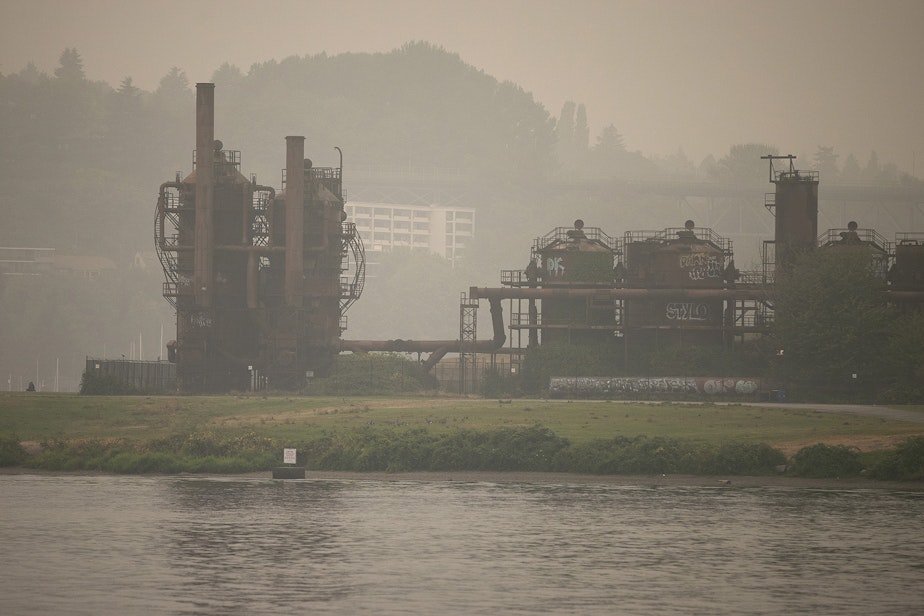Wildfire smoke is here to stay. But critics say our preparations are still 'lackadaisical'

In early September 2017, the air in the Seattle area was smoky for days. Back then, Ruben Armas was 21 years old, working as a server at a restaurant on Alki Beach. He waited on outdoor tables and breathed in smoke all day.
“I just remember coming out of work and being really, really tired, and then having the worst of headaches,” Armas said. “I took Tylenol; it didn’t go away. It was just irritating to where I was like, ‘Man, I’m just going to go to the doctor.’”
“He had to go to the ER,” said Armas’ partner, Jazmin Davila, “and they told him that it was just like a big migraine from the smoke.”
Armas had to take two days off work, and he went back to using an inhaler, the way he had when he was a kid with asthma.
August and September in the Pacific Northwest now come with a reliable risk of wildfire smoke. When it rolls in, the sky turns orange and hazy. The air smells like a campfire. And our health — physical and mental — suffers. But local governments are still working out how to protect people from this polluted air.
It’s not just Armas who suffers during wildfire smoke events. Lots of people’s asthma and other lung conditions get worse. And, like Armas, more people end up in the emergency room. When pregnant women breathe smoky air, babies are born smaller.
For some, the smoke can be fatal. Researchers estimate that Washington state’s two weeks of wildfire smoke in 2020 contributed to about 160 deaths.
Sponsored
This year, for the first time, Ruben Armas and his family were able to afford an air purifier and portable air-conditioning unit for their apartment in White Center.
Armas said he figures smoky, hot summers are here to stay.
County leaders see that too.
“We’re trying to adapt as quickly as we can to the hazards and threats that we’re facing and how they’re changing because of climate change,” said Brendan McCloskey, director of emergency management for King County.
He said the county is working to get federal money for homeowners so they can prepare their homes for climate change.
Sponsored
“We as a county, working with our cities, are looking to put a program together where we could deliver heat pumps, air conditioners, or whatever the program ultimately comes up with, to people in King County,” McCloskey said. “We’d probably focus on the areas that are most underserved.”
And King County’s executive branch is trying to find funding for things like providing hotel vouchers to homeless people during extreme heat or wildfire smoke events.
But none of that is happening this year.
So, in the meantime, the county’s main strategy is to inform the public when smoke is coming and give people advice about how to clean the air inside their own homes. In other words, it’s mostly on individuals to prepare for the smoke.
Dan Jaffe is a professor of atmospheric chemistry at the University of Washington in Bothell. He’s frustrated by the government response. He thinks they aren’t doing enough fast enough.
Sponsored
“It takes long-term planning and thinking about what’s going to work best in your community,” he said, “and that’s a lot of work.”
King County didn’t write their “smoke incident playbook” till after the smoky weeks in September 2020.
Jaffe said that was late. Years earlier, it had become obvious that Seattle’s reliably clear, mild summers were a thing of the past.
“Certainly by 2018 we could see this was happening with more and more frequency,” he said.
That’s because of climate change, forest management decisions that make bigger fires more likely, and more people living in or near the wilderness and starting fires.
Sponsored
But Jaffe said he's not just frustrated with the government. He said individuals also aren’t taking this seriously enough.
“I am surprised at how lackadaisical people are about health risks like this,” he said. “The health effects are real, and it’s important for people to do something about it, and it’s not that hard to do something.”
Jaffe said people need something to clean their air, like air purifiers — ideally in every room. And then they need something to cool the air, like portable air conditioning. The cheapest option is getting box fans with filters attached.
These days, Ruben Armas is no longer a server in Alki. He now manages a pizza restaurant.
“We close down for the hot days,” he said. “So if it’s smoky outside, why would you want to be open?”
Sponsored
Armas said it doesn't matter how prepared you are for the smoke if work requires you to be there, breathing unhealthy air. He wishes smoky days were like snow days, with everyone hunkered down at home, waiting for it to pass.




